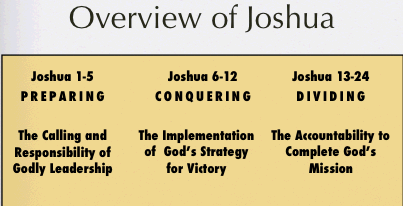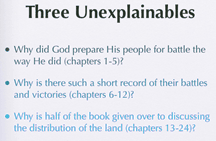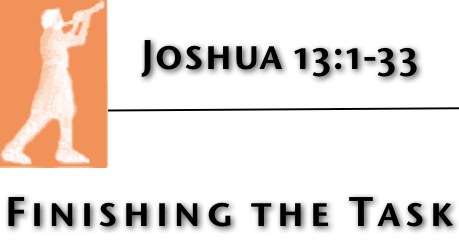|
|
– A Life Commentary –
Finishing the Task (Intro) | Pass the Vision (13:1) | Shows the Need (13:2-5) |
Lives by Faith (13:6) | Distributes Responsibility (13:7-33)
Bible Study on Joshua 13:1-33
Paul J. Bucknell
True success depends not only how well we have carried out our own specific duties but also on how we have inspired, encouraged and equipped others to join in doing God's kingdom work. Each man is responsible to be part of God's work. We are called to be involved.
Joshua 13:1 marks a significant point in the Book of Joshua. This verse forms a major dividing point in the book. The Lord in a sense seizes control of the book and commandeers how it would be completed. It is surprising to see what He has written here!
 Joshua can be divided into three parts. Chapters 1-5 helps us see how God prepared the Israelites for the battle. We see the results of this faith in part 2, chapters 6-12. Chapter 12, in fact, summarizes the stream of victories under Moses and Joshua’s leadership. Defeat only occurred when they did not trust and obey. What God promised, came true. Listen to the powerful summary in Joshua 11:23, “So Joshua took the whole land, according to all that the LORD had spoken to Moses, and Joshua gave it for an inheritance to Israel according to their divisions by their tribes. Thus the land had rest from war.” The third part starting in chapter 13:1 is what we want to discuss today. It is here that the land that they won in battle, plus more, is distributed to the twelve tribes.
Joshua can be divided into three parts. Chapters 1-5 helps us see how God prepared the Israelites for the battle. We see the results of this faith in part 2, chapters 6-12. Chapter 12, in fact, summarizes the stream of victories under Moses and Joshua’s leadership. Defeat only occurred when they did not trust and obey. What God promised, came true. Listen to the powerful summary in Joshua 11:23, “So Joshua took the whole land, according to all that the LORD had spoken to Moses, and Joshua gave it for an inheritance to Israel according to their divisions by their tribes. Thus the land had rest from war.” The third part starting in chapter 13:1 is what we want to discuss today. It is here that the land that they won in battle, plus more, is distributed to the twelve tribes.
Although the Book of Joshua has a very clear and dynamic message, it does have a few things that are difficult to explain. Let me call them unexplainables. These hard to understand sections are subtle but significant points in the Book lying beneath the surface. Let me introduce three of these unexplainables and at the same time review what we have studied up to this point.
Unexplainable #1
Why did God prepare His people for battle the way He did (chapters 1-5)? His preparation is different than what we would expect. Normally, we would expect combat training, but this is not what they received. His training, however, did in fact enable the Israelites to have victory after victory. John says, “For whatever is born of God overcomes the world; and this is the victory that has overcome the world--our faith” (1 John 5:4). Hopefully, we now recognize that the training of their faith and loyalty had everything to do with their victories. They learned to trust God to bring about the victories. He in the end was given praise.
 Unexplainable #2
Unexplainable #2
Another unexplainable is the short record of battles and victories. We have only a few battles recorded in chapters 6-12. They are not typical of the normal battle scenes and descriptions that one would expect to read of. The absence of the gory detail involved in conquering the land leaves us stunned. In the end, we are forced to conclude that this exciting descriptions did not play an important part. Instead, we get to see how what they did right and wrong brought either victory or defeat. There were two important matters to see: (1) God was winning the battles, whether it was Jericho or against a great array of armies. (2) The Israelites were conquering the land at a fast pace, just as God had alluded they would. Few battles were recorded, but the ones that were showed something more important: the way of success and defeat.
Unexplainable #3
The third unexplainable is why half of the book is given over to largely discussing the distribution of the land to the hands of the Israelites. I am not saying that we should altogether disregard this topic, especially, if it was summarized and deposited into one, two or three chapters at the most. But the fact is that the whole rest of the book is oriented around it. This discussion is too long to ignore. We need to slow down and ponder upon what God is doing. Why did Joshua spend 1/2 of the book on the distribution of the land to the twelve tribes? Why is it so important?
In order to get things into perspective, perhaps we could use an analogy. Say we all loved Jack. God did great things in his life but now he is dead. So Jack’s friends got together and made up a 24 hour film festival of his life. When everyone came to see it, they were taken aback. Here is that very successful Jack. Just as they were starting to see all his accomplishments, it seemed that the film was coming to a very fast close. His life was summarized in short segments of time that took up only twelve hours of time (1/2). The audience began wondering, “Well, this last part must be the greatest, but what is he going to say since everything was already discussed?” How odd it would be if the last twelve-hour episode ended up being a careful analysis of his will and the instructions he gave to those who would receive his inheritance. Although Joshua was alive when this was written and the will declared, much time was spent on the details. This somewhat serves as a parallel Jesus’ last week of His life on earth.
The truth of this last unexplainable is often overlooked. The way we understand and live out God’s will is only half of the battle. The other half is how we pass this vision on to others. In other words, the Lord is not only concerned about our great experiences with Him and the way He used us in our lives. He has an equal concern on how our lives are used to lead others to have this same vision and live out His righteous ways. We are only half successful if we gain the vision of what God wants for us and attempt to live it out. We are wholly successful when we have rightly trained those in succession to us to possess the same grand vision of God and His plans and equip them to do likewise.
This last section of this book is initiated by the Lord. The Lord was preoccupied about this matter. If it was not properly dealt with, then it would wrongfully be neglected. As a pastor, I have seen one of the greatest assets to a church are godly leaders who pass their vision on.
 As we more closely observe this text, we will discover four important aspects to genuine success. Joshua apparently was successful this way. It is said of him, “And Israel served the LORD all the days of Joshua and all the days of the elders who survived Joshua, and had known all the deeds of the LORD which He had done for Israel” (Joshua 24:31). The work of Joshua went on even though he was not physically there at least for one more generation. Those who know the Book of Judges will quickly recognize that after that generation, the vision of godly living perished and was not passed on. The succeeding period in Israel’s history was not to be emulated.
As we more closely observe this text, we will discover four important aspects to genuine success. Joshua apparently was successful this way. It is said of him, “And Israel served the LORD all the days of Joshua and all the days of the elders who survived Joshua, and had known all the deeds of the LORD which He had done for Israel” (Joshua 24:31). The work of Joshua went on even though he was not physically there at least for one more generation. Those who know the Book of Judges will quickly recognize that after that generation, the vision of godly living perished and was not passed on. The succeeding period in Israel’s history was not to be emulated.
This passage was written and preserved so that we would learn to emphasize its importance. Let’s focus on four critical parts to being a successful Christian.
A) The truly successful man recognizes the importance of passing on the vision.
B) The truly successful man knows what is yet needed to fulfill God’s vision.
C) The truly successful man is spurred on in faith by the promises of God.
D) The truly successful man inspires vision and distributes the responsibility while still living.
We will now look at these four points, one by one.
Next > Knows the Need
|
Reaching Beyond Mediocrity (Joshua 10:1-43)
– The Day the Sun Stood in the Sky – Skepticism and Higher Bible Criticism Joshua 10:12-14 Interpretations of the 'Sun stood in the sky.' Joshua 10:12-14 Purpose of Recording the Miracle Joshua 10:1-11: A. Joshua's Sincere Obedience Joshua 10:12-43: B. Joshua's Quest for God's Best Joshua 10:1-43: Bible Study Questions |
|
|
Mobilizing God's People (Joshua 1:10-18)
Joshua 1:10-18: Introduction to Moblizing God's People
Joshua 1:10-11: A. Communicates God’s Will Joshua 1:12-15: B. Demands Total Participation Joshua 1:16-18: C. Responds With A Clear Commitment Joshua 1:10-18: Bible Study Questions |
Finishing the Task (Joshua 13:1-33)
Joshua 13: Introduction: 3 Unexplainables
Joshua 13:1 Passes on the Vision Joshua 13:2-5 Knows the Need Joshua 13:6 Lives by Faith Joshua 13:7-33 Distributes the Responsibility Joshua 13:1-33 Bible Study Questions |
|
Victory over Strongholds (Joshua 6:1-27)
Joshua 6:1-27 The Lesson from Jericho Joshua 6:1 Our Need for God's Power Joshua 6:2-5 Our Discovery of God's Solutions Joshua 6:6-27 Our Participation in God's Victory Joshua 6:1-27 Summary: You can win too! Joshua 6:1-27_Bible_Study_Questions |
Obtaining a Greater Portion (Joshua 21)
Joshua 21 Introduction: A Greater Deal Joshua 21:1-7 A Special Calling Joshua 21:8-42 A Special Service Joshua 21:43-45 A Special Promise Joshua 21 Bible Study Questions |
| Effectively Dealing with Defeat & Despair (Joshua 7:1-15) Joshua 7:1-15: Learning about Defeat and Failures Joshua 7:1-5: Falling into Failure Joshua 7:6-10: Staying in Disgrace Joshua 7:11-15: Road to Recovery Joshua 7:1-15: Bible Study Questions |
|
BFF Homepage | Top | Back | Bible Topics | Joshua intro | Joshua 13 Questions | Next
Biblical Foundations for Freedom
Rev. Paul J. Bucknell
NASB used unless noted
